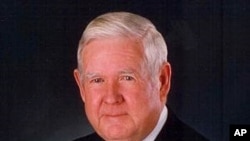Representative John Murtha, a key pro-defense Democrat who during 36 years in the U.S. House of Representatives became one of the most powerful members of Congress, died on Monday at age 77 of complications from surgery. We offer this look at Murtha's long and often controversial career, particularly the last years of his life when he became a vocal opponent of the former President George W. Bush's military involvement in Iraq.
At 1.9-meters-tall, John Murtha towered over most other lawmakers, and could always be depended upon to give a reporter his time on questions regarding funding for the U.S. military and soldiers fighting in foreign battles.
When he passed away of complications from gallbladder surgery, Murtha - a Vietnam War veteran with two Purple Hearts and a Bronze Star - headed the powerful Subcommittee on Defense of the House Committee on Appropriations, a position he was elected to in 1974 and used to push for Pentagon funding.
He was among the most skillful politicians on Capitol Hill at channeling funds to his local district through "earmarks" -- provisions in legislation directing that money be spent on specific projects.
Although he voted in support of a resolution in late 2002 to authorize use of military force in Iraq, Murtha gradually became disillusioned with the conduct of the war.
As he stepped up his criticism, he became a proponent of "redeploying" American troops out of Iraq, but maintaining forces at sufficient levels in the region to respond quickly to emergencies as needed.
In an exchange with Republican Representative Patrick McHenry in 2006, the Pennsylvania Democrat angrily lashed out at Republicans he said had failed to recognize the strain the Iraq War had placed on the military.
MCHENRY: "The left in this country have a policy they are advocating here, and they are advocating a policy called 'cut and run.' They are advocating a policy of waiving a white flag to our enemies."
MURTHA: "When I hear somebody standing here sanctimoniously saying we are going to fight this out, we're not fighting at all. It's the troops that are doing the fighting, the families that are doing the sacrificing. A very small proportion of families in this country are doing the sacrificing and that's why I get so upset when they [i.e., Republicans] stand here sanctimoniously saying, 'We are fighting this thing.' It's the troops that are doing the fighting, not the members of Congress who are doing the fighting."
The same year, Murtha became the center of controversy with his allegation that U.S. soldiers had killed unarmed civilians "in cold blood" in the Iraqi city of Haditha, which he attributed to the strain on U.S. forces. He suggested that the military tried to cover up the alleged incident.
He reacted angrily to revelations that U.S. soldiers and interrogators at Abu Ghraib prison in Iraq had physically and psychologically tortured prisoners, saying in a speech on the House floor that "no circumstance whatsoever justifies torture - no emergencies, state of war, no level of political instability."
"The words torture, cruelty and abuse elicit images of draconian and brutal dictatorship," said John Murtha. "These words are reserved for the worst of human rights offenders and should never include the United States of America."
In his more than three decades in Congress, Murtha was also the focus of ethical controversies, most recently centering on contributions by lobbyists and corporate clients to his campaign coffers.
In 1980, he was caught up in the FBI anti-corruption sting operation called ABSCAM in which he was videotaped turning down a $50,000 bribe. But he indicated that he might accept future offers. Named an unindicted co-conspirator, he testified against two lawmakers in the case, in which six members of Congress were convicted.
In 2006, after Democrats captured control of the House of Representatives from Republicans in mid-term elections, Murtha was endorsed by the current House Speaker Nancy Pelosi to lead the Democratic majority. Maryland Representative Steny Hoyer won the position after a Democratic caucus election.
Murtha's death sets up a special election for his congressional seat, which will likely be held in the next three months. Political analysts say the contest to replace him could be competitive, despite Murtha having held the seat for 36 years.
His death comes at a time of increased anxiety among Democrats ahead of November's mid-term congressional elections, with House Democratic leaders already engaged in efforts to hold on to their strong majority, and President Barack Obama and Democrats facing virtually unified Republican opposition on major policy issues.
In a statement Monday, President Obama and his wife Michelle said they were "deeply saddened" to learn of Congressman Murtha's death, calling him a respected voice on issues of national security.
House Speaker Pelosi said that as a former Marine, Murtha was "well-recognized as a champion of [U.S.] national security," adding that he always put the troops and their families first.









